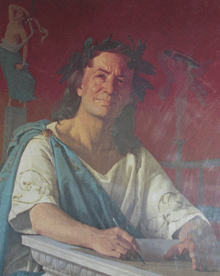Quotes
- At court, far from regarding ambition as a sin, people regard it as a virtue, or if it passes for a vice, then it is regarded as the vice of great souls, and the vices of great souls are preferred to the virtues of the simple and the small.
- Louis Bourdaloue, as quoted in The Bourgeois: Catholicism vs. Capitalism in Eighteenth-Century France (1927), p. 137
- Every other vice hath some pleasure annexed to it, or will admit of some excuse, but envy wants both.
- Robert Burton, The Anatomy of Melancholy
- The vices of which we are full we carefully hide from others, and we flatter ourselves with the notion that they are small and trivial; we sometimes even embrace them as virtues.
- John Calvin, Golden Booklet of the True Christian Life, pg. 32
- Study to sever pleasure from vice.
- Descartes, Discourse on Method, J. Veitch, trans. (1899), part 3, p. 32
- There are no vices more dangerous than those which simulate virtue.
- Erasmus, The Handbook of the Christian Soldier (1501), as translated by Charles Fantazzi, in The Erasmus Reader (1990), p. 146
- To flee vice is the beginning of virtue, and to have got rid of folly is the beginning of wisdom.
- Horace, Epistles, Book I, epistle 1, line 41
- No vice exists which does not pretend to be more or less like some virtue, and which does not take advantage of this assumed resemblance.
- Jean de La Bruyère, Characters, H. Van Laun, trans. (London: 1885) “Of the Affections,” #72
- We must carefully teach children to detest vices for what they consist in; we must teach them their natural ugliness, so that they flee them not only in their deeds but in their minds: the very thought of them should be hateful, whatever mask they hide behind.
- Montaigne, Essays, as translated by M. A. Screech, p. 124
- L’hypocrisie est un hommage que le vice rend à la vertu.
- Hypocrisy is a tribute vice pays to virtue.
- François de La Rochefoucauld, Maxims, L. Tancock trans., #218
- Hypocrisy is a tribute vice pays to virtue.
- Aliena vitia in oculis habemus, a tergo nostra sunt.
- The vices of others we have before our eyes, our own are behind our backs.
- Seneca the Younger, in Latin Quotations (New York: 2005), p. 7
- The vices of others we have before our eyes, our own are behind our backs.
- The problem with people who have no vices is that generally you can be pretty sure they're going to have some pretty annoying virtues.
- Elizabeth Taylor, as quoted in The Seven Deadly Sins (2000) by Steven Schwartz, p. 23.
- I haven't a particle of confidence in a man who has no redeeming petty vices whatsoever.
- Mark Twain, "Answers to Correspondents", The Californian, 17 June 1865. Reprinted in The Celebrated Jumping Frog of Calaveras County, and Other Sketches (1867).
See also
External links
Virtues
Altruism • Asceticism • Beneficence • Benevolence • Bravery • Carefulness • Charity • Cheerfulness • Cleanliness • Common sense • Compassion • Constancy • Courage • Dignity • Diligence • Discretion • Earnestness • Faith • Fidelity • Forethought • Forgiveness • Friendship • Frugality • Gentleness • Goodness • Grace • Gratitude • Holiness • Honesty • Honor • Hope • Hospitality • Humanity • Humility • Integrity • Intelligence • Justice • Kindness • Love • Loyalty • Mercy • Moderation • Modesty • Optimism • Patience • Philanthropy • Piety • Prudence • Punctuality • Poverty • Purity • Self-control • Simplicity • Sincerity • Sobriety • Sympathy • Temperance • Tolerance
Vices
Aggression • Anger • Apathy • Arrogance • Bigotry • Contempt • Cowardice • Cruelty • Dishonesty • Drunkenness • Egotism • Envy • Evil speaking • Gluttony • Greed • Hatred • Hypocrisy • Idleness • Ignorance • Impatience • Impenitence • Ingratitude • Inhumanity • Intemperance • Jealousy • Laziness • Lust • Malice • Neglect • Obstinacy • Philistinism • Prejudice • Pretension • Pride • Recklessness • Self-righteousness • Selfishness • Superficiality • Tryphé • Unkindness • Usury • Vanity • Worldliness
